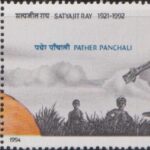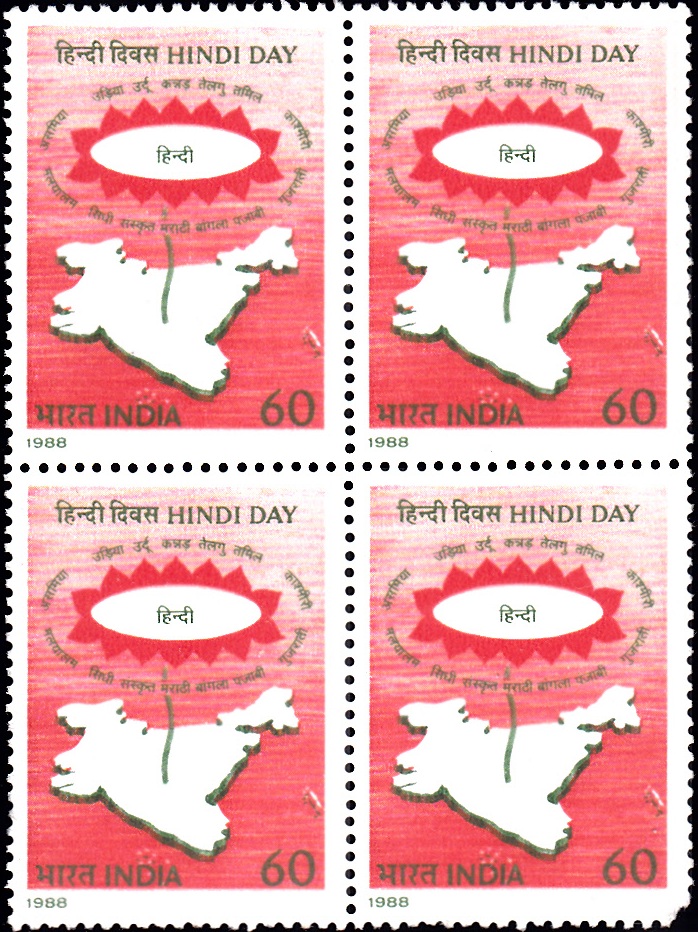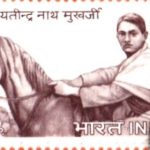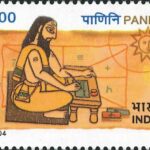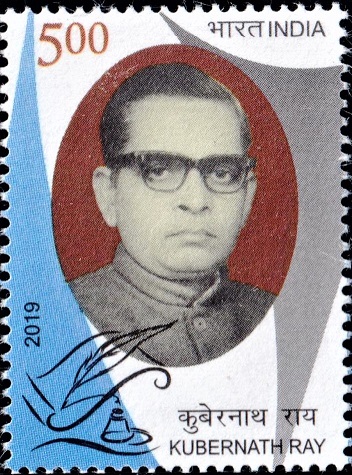
Kuber Nath Rai
A commemorative postage stamp on Kuber Nath Rai, a Hindi writer and a scholar of Sanskrit :
 Issued by India
Issued by India
Issued on Mar 9, 2019
Issued for : Department of Posts is pleased to issue a Commemorative Postage Stamp on Kubernath Ray.
Credits :
Stamp/First Day Cover/Brochure/Cancellation Cachet : Smt. Alka Sharma
Type : Stamp, Mint Condition
Colour : Multi Colour
Denomination : 500 Paise
Stamps Printed : 3.0 lakh
Printing Process : Wet Offset
Printer : Security Printing Press, Hyderabad
Name : Kuber Nath Ray
Born on Mar 26, 1933 at Matsa village, Dildarnagar Kamsar, Ghazipur, Uttar Pradesh, British India
Died on Jun 5, 1996 at —
About :
- An eminent scholar of Hindi and English and a great thinker, Shri Kubarnath Ray particularly distinguished himself in the field of writing essay in Hindi. He was born on 26th March 1933 in village Matsa of Zamania Tehsil in Ghazipur, Uttar Pradesh. He was the son of Smt. Lakshmi Devi and Shri Baikuntha Rai. His mother would say that children in general are born with their fists closed while her son was born with folded hands as if in prayer. He completed his primary, middle and high school education at Ghazipur. He did his Intermediate from Queen’s College, Varanasi and Graduation from Banaras Hindu University with English, Philosophy and Mathematics as his subjects. He went on to do his post-graduation from Kolkata University in English Literature.
- Kubernath Ray’s creative writing primarily deals with general public life in Aryan and non-Aryan India, Gandhian philosophy, stories of Lord Rama and modern contemporary thinking. Personal essays are a fundamental feature of his writing. All the modes of literary writing such as poetry, story, novel, play, etc. may be discovered in his writings. About his literary compositions, he used to say that they were an expression of his inner voice and promptings which were not forced or laboured. He would say that English was the language for his earning needs, Hindi was his natural language for prayer and devotion.
- He served as a Lecturer and Head of English Department in Nalbari College, Nalbari & Guwahati University, Assam from 1959-1986. Later, he was the Principal of Swami Sahajanand P.G. College, Ghazipur (UP) during 1986-1995 from where he retired on 30th June 1995.
- Some of his works are Priya Nilkanthi (published in 1969), Ras Aakhetak (1971), Gandhmaadan (1972), Nishad Bansuri (1973), Vishad Yoga (1974), Pam Mukut (1978), Mahakavi ki Tarjani (1979), Patr: Maniputul Ke Naam (1980), Man Pawan ki Nauka (1982), Kirat Nadi Me Chandramadhu (1979), Drishti Abhisar (1985), Treta ke Brihatsam (1986), Kaamdhenu (1990), Maraal (1993), Uttarkuru (1993), Cinmaya Bharata (1996), Kanthamani (Kavita) (1998), Vani ka Sheersagar (1998), Andhakar me Agnishikna (2008), Ramayana Mahatirtham (2008), Agam Ki Nav (2013), Kuber Nath Ray Ki Drishti Me Swami Sahajanand (2014) were works published after his death. Twenty research scholars have been awarded Ph.D. for their works on his books.
- Kubernath Ray is known to have avoided stage garlanding, public meetings and specifically public speaking. He used to say that it affected his creative writing. Several words like Nishad, Kirat and some words taken from languages spoken in Southern States of India have been amalgamated by him into Sanskrit and Hindi vocabulary and these are found in his compositions as well.
- Reacting to some criticism for use of difficult words in his writings, Ray responded by saying that every creative writer is a teacher, his duty is to enlarge the reader’s range of knowledge. He believed that a true and keen reader would try to find out the meaning of unfamiliar words. Through his knowledge of English language, Ray became acquainted with the literature of several languages of the world. In addition to Hindi, which was his mother tongue, he knew Urdu, Arabic and Persian. He has a good command of Bengali language and was familiar with Greek and Roman languages and their literature also. He was well versed in Sanskrit, which is considered to be the mother of all Indian languages. He died on 5th June 1996.
- Text : Based on information received from the proponent.
Subscribe
Login
0 Comments
Oldest




